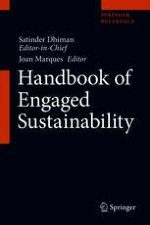2018 | OriginalPaper | Buchkapitel
Moving Forward with Social Responsibility
Shifting Gears from Why to How
verfasst von : Joan Marques
Erschienen in: Handbook of Engaged Sustainability
Aktivieren Sie unsere intelligente Suche, um passende Fachinhalte oder Patente zu finden.
Wählen Sie Textabschnitte aus um mit Künstlicher Intelligenz passenden Patente zu finden. powered by
Markieren Sie Textabschnitte, um KI-gestützt weitere passende Inhalte zu finden. powered by
